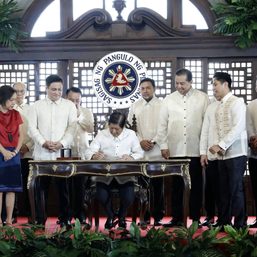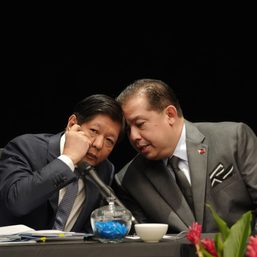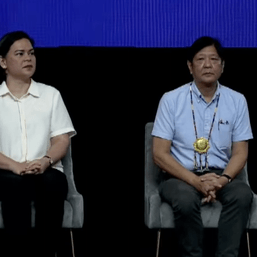SUMMARY
This is AI generated summarization, which may have errors. For context, always refer to the full article.

On May 22, 2023, President Ferdinand Marcos Jr. sent a letter to Senate President Juan Miguel Zubiri to certify as urgent the passage of the Maharlika Investment Fund Senate bill.
This is problematic for many reasons.
First, the justification Marcos used was totally wrong.
He cited “the downgrade of the global growth projection this year on account of debilitating inflation, fluctuating and unstable prices of crude oil and other fuels due to the protracted conflict between Ukraine and Russia, and continuing interest rate hikes in the international financial sector…”
All of these are reasons not to pursue a sovereign wealth fund at this time.
For instance, so long as inflation and interest rates are elevated, the prices of long-term bonds go down, and so the returns on long-term bond investments by Maharlika will unlikely be large.
Second, Marcos is desperately trying to make it appear like Maharlika will be a proverbial goose that lays the golden egg.
He said that because of the abovementioned economic conditions, “there is a compelling need for a sustainable national investment fund as a new growth catalyst to accelerate the implementation of strategic and high-value infrastructure projects that will stimulate economic activity and development.”
First, the Maharlika bill confuses financial returns and economic returns. The latter may be actually larger than the former.
As my economist friend and colleague Enrico Villanueva said on Twitter, “The reality is even the [country’s] best fund managers can only eke out less than 5% YTD return on PH equities.” Meanwhile, the growth rate of our economy averaged above 6% before the pandemic.
This is why many economists are saying that maybe it’s better to just use the Maharlika’s billions of pesos on the government’s development programs directly, rather than pour them in a sovereign wealth fund with dubious or highly uncertain financial returns.
Still a bad bill
What’s more, the Senate’s Maharlika bill (Senate Bill 2020) is still quite bad and failed to fix the defects of the House bill rushed in end-2022. You can check out the bill on the Senate’s website.
For instance, in Section 6, the Maharlika Investment Corporation or MIC (which will manage the Maharlika Investment Fund) shall have a whopping authorized capital of P500 billion, and P125 billion of that will be sourced from:
- Land Bank of the Philippines or LBP (P50 billion)
- Development Bank of the Philippines or DBP (P25 billion)
- National Government (P50 billion)
Economists have previously pointed out that siphoning capital from state banks is ill-advised because such banks will no longer be able to meet their capitalization requirements as set by the Bangko Sentral ng Pilipinas. Also, it’s rather imprudent to take away capital from these banks, especially after the recent bankruptcies of Silicon Valley Bank and other US banks.
The P50 billion from the National Government also means that taxpayers will pay for Maharlika’s seed fund, too, with their hard-earned money. Isn’t that money better spent on government projects directly, and not gambled away in this time of global uncertainty?
The Senate bill also didn’t spare the Bangko Sentral’s dividends, all of which, in the Maharlika fund’s first two years,“shall be remitted to the National Government for the capitalization of the MIC.”
But this will inevitably delay the BSP’s own capitalization efforts. Based on its amended charter, it needs to raise capital of P200 billion, which currently it doesn’t have. (Note that Maharlika will have a total authorized capital of P500 billion, larger than the BSP’s!)
This is the problem when you want to set up a sovereign wealth fund even if the government doesn’t have excess revenues.
Abroad, legitimate sovereign wealth funds are typically set up using surpluses (coming from, say, windfalls from oil resources). The Philippines doesn’t have such a surplus of money; in fact we had a deficit of more than P1.6 trillion in 2022.
Maharlika may end up gambling off money that we don’t have in the first place.
What safeguards?
The Senate bill also proposes a poor governance structure for Maharlika, and put in safeguards that, on closer inspection, aren’t really safeguards.
For instance, the chairperson of the MIC’s board will still be the finance secretary, and this can open the floodgates for politicization. Other board members include the MIC’s CEO (head of operations), and the presidents of LBP and DBP, who are also somehow under the control of the finance secretary. (In fact, as we speak, Secretary Ben Diokno is overseeing the merger of Landbank of the Philippines and Development Bank of the Philippines.)
The President himself has an outsize role in the setting up and operations of Maharlika. For instance, “the organizational structure, staffing pattern and compensation structure of the MIC shall be subject to the approval of the President of the Philippines.” He also appoints the CEO, who has a term of three years.
The Santiago Principles, a set of principles that sovereign wealth funds ought to observe – and Maharlika will purportedly “adhere to” – says that a sovereign wealth fund’s management ought to be “operationally independent from the owner.”
But by setting up the board this way – where the President’s appointees are both in the board and in the MIC’s operations – is the Senate bill in violation of the Santiago Principles?
In addition, an advisory body – “which shall provide guidance, counsel, and advice” to the MIC’s board – will comprise three people, namely the budget secretary, the National Economic and Development Authority or NEDA secretary, and the treasurer of the Philippines. All of them follow the orders of the President. Where is the independence?
The Senate bill also sets up a flimsy risk management unit, which ought to police the investments made by Maharlika and identify, analyze, and mitigate risks to the fund. Specifically, it will comprise “two senior executives of the MIC, one independent director, and one auditor.”
According to my friend Enrico, who happens to be a longtime chief risk officer and consultant for banks before, “This is WRONG as these people form three separate lines of defense and must be independent of each other. Appoint an independent CRO [chief risk officer].”
What investments can Maharlika get into? Rather disturbingly, the list includes “loans and guarantees to, or participation into joint ventures or consortiums with Filipino and foreign investors” (why will Maharlika be a lending company?), as well as “other investments as may be approved by the Board” (a catch-all that is extremely prone to corruption).
Finally, the Senate bill also exempts Maharlika from the GOCC Governance Act of 2011, which was originally designed to “ensure that the operations of GOCCs are transparent and responsive to the needs of the public.” This may also be violative of the Santiago Principles.
Maharlika will be exempt as well from the Government Procurement Reform Act, specifically in the hiring of “professional and technical services” for “fund management, investment analysis, advisory and underwriting, securities brokerage and dealership, and capital market and equity research analysis.” This might pave the way for astronomical fees for those managing Maharlika (turning the fund into what UPSE Professor Emerita Winnie Monsod previously called a “milking cow”).
Deodorizing Maharlika
In sum, red flags abound in the Senate version of the Maharlika bill, and God knows what they will later cook up with the House in the bicameral conference committee meetings.
Even so, the President’s economic managers, including the finance secretary, NEDA secretary, and Bangko Sentral ng Pilipinas governor – all of whom have PhDs and taught at the UP School of Economics before – are still fully backing up Maharlika. In fact, they all appeared in the Senate’s session hall on May 24 to show their support for Maharlika.
Lots of economists I know are also disappointed, given the dubious nature of Maharlika and the myriad risks it poses to our public coffers and financial system.
Is this another case of technocrats being used to deodorize (and willfully agreeing to deodorize) the bad policies of another Marcos government? – Rappler.com
JC Punongbayan, PhD is an assistant professor at the UP School of Economics and the author of False Nostalgia: The Marcos “Golden Age” Myths and How to Debunk Them. JC’s views are independent of his affiliations. Follow him on Twitter (@jcpunongbayan) and Usapang Econ Podcast.
1 comment
How does this make you feel?




![[In This Economy] What foreigners are saying about the Maharlika fund](https://www.rappler.com/tachyon/2023/12/TL-foreigners-maharlika-fund-dec-1-2023.jpg?resize=257%2C257&crop_strategy=attention)


![[ANALYSIS] Economists vs Maharlika: Some key points](https://www.rappler.com/tachyon/2023/06/maharlika-fund-TL-june-9-2023.jpg?resize=257%2C257&crop=436px%2C0px%2C1080px%2C1080px)
![[In This Economy] Marcos’ POGO ban is popular, but will it work?](https://www.rappler.com/tachyon/2024/07/thought-leaders-marcos-pogo-ban.jpg?resize=257%2C257&crop=255px%2C0px%2C720px%2C720px)
![[Rappler Investigates] POGOs no-go as Typhoon Carina exits](https://www.rappler.com/tachyon/2024/07/newsletter-graphics-carina-pogo.jpg?resize=257%2C257&crop=424px%2C0px%2C1080px%2C1080px)









![[In This Economy] Part 2 | POGOnomics: Are we banning POGOs out of fear, outrage, not rational thought?](https://www.rappler.com/tachyon/2024/06/thought-leaders-pogonomics-part-2b.jpg?resize=257%2C257&crop=292px%2C0px%2C720px%2C720px)
![[In This Economy] POGOnomics: Weighing the costs and benefits of POGOs](https://www.rappler.com/tachyon/2024/06/thought-leaders-pogonomics-part-1.jpg?resize=257%2C257&crop=279px%2C0px%2C720px%2C720px)
![[In This Economy] Is the Philippine economy stable?](https://www.rappler.com/tachyon/2024/05/philippine-economy-stable-may-10-2024.jpg?resize=257%2C257&crop=461px%2C0px%2C1080px%2C1080px)

![[EDITORIAL] Apat na taon na lang Ginoong Marcos, ‘di na puwede ang papetiks-petiks](https://www.rappler.com/tachyon/2024/07/animated-bongbong-marcos-2024-sona-day-carousel.jpg?resize=257%2C257&crop=280px%2C0px%2C720px%2C720px)
![[In This Economy] Delulunomics: Kailan magiging upper-middle income country ang Pilipinas?](https://www.rappler.com/tachyon/2024/07/in-this-economy-upper-middle-income-country.jpg?resize=257%2C257&crop=421px%2C0px%2C1080px%2C1080px)

![[EDITORIAL] Marcos Year 2: Hilong-talilong](https://www.rappler.com/tachyon/2024/07/animated-bongbong-marcos-2nd-sona-carousel.jpg?resize=257%2C257&crop=136px%2C0px%2C720px%2C720px)
![[Newspoint] A fighting presence](https://www.rappler.com/tachyon/2024/07/thought-leaders-a-fighting-presence.jpg?resize=257%2C257&crop=441px%2C0px%2C1080px%2C1080px)



![[WATCH] Bamban POGO scandal: There’s a bigger fish than Alice Guo](https://www.rappler.com/tachyon/2024/07/inside-track-tcard-bamban-pogo.jpg?resize=257%2C257&crop=435px%2C0px%2C1080px%2C1080px)
Thanks to Prof. JC Punongbayan for this mind opener article on the Maharlika Investment Fund (MIF) Senate Bill. Unfortunately, the said Bill will be railroaded in compliance with the PBBM’s “order”. It is a pity that some Topnotch Technocrats are perhaps “being used to deodorize (and willfully agreeing to deodorize) the bad policies of another Marcos government?”